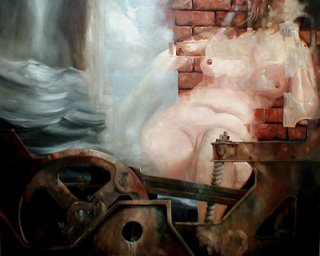Rod Guthrie
 I was sad to learn that an acquaintance of mine, Rod Guthrie, had died recently. Rod was a talented and unusual fellow, an artist married to another artist. Carole is a member of my poetry group, and so I had occasion to meet her husband from time to time.
I was sad to learn that an acquaintance of mine, Rod Guthrie, had died recently. Rod was a talented and unusual fellow, an artist married to another artist. Carole is a member of my poetry group, and so I had occasion to meet her husband from time to time.Our poetry group meets every couple of weeks at the home of one or another of us. We have a light supper before getting down to business. We take turns reading something we've written and critiquing each piece. Sometimes spouses join us for the meal, but they always disappear before the poetry session.
I always loved going to Carole's house because it was so inviting. Way out in the woods in Monson, cozy, comfortable, art everywhere--Carole's large, bright, non-representational canvases, and this one of Rod's, Love and Marriage and the Number 43. In the winter, hot soup and a blazing fire. Carole loved having us because Rod had developed a progressive neurological disorder. She was going out less and less as she began caring for him more and more.
Unlike the other spouses, Rod would sometimes sit in with us and read a piece he'd written. Not poetry, but excerpts from a memoir he was writing. He spun a pretty good tale, and between those pieces and our conversations, I learned a fair amount about him.
Rod was an industrial designer who had worked for a long time on Lionel trains, both as independent contractor and employee. His business was making model railroad kits; he also made exact reproductions of old firearms, and painted. It was unfortunate that someone so talented with his hands should end up with a disease that eventually made it impossible for him even to feed himself. But he was cheerful about his condition, and simply acquired assistive devices--like a hands-free TetraMouse for his computer--to be able to continue working.
His serene acceptance of his disease impressed me. Rod never tried to draw attention to himself. In fact, he was one of those rare people who really seemed to listen to others. When he'd struggle to turn a page, drop a fork, or spill his coffee, he'd make a joke of it.
I'd never known Rod before he was afflicted with ALS or whatever it was (he himself said doctors weren't sure), and I'd never seen him any other way but gentle and funny. It's easy to imagine, when someone makes something look easy, to believe it is easy. So I was surprised, at the last meeting I attended at the Guthries', to hear what he had to say on the the subject of his disease.
In that last piece, he detailed the stages of his disease, and the progression of his feelings. The disbelief, the anger, the self-pity...all the normal and inevitable stages of grief which have been so frequently chronicled. I listened in shock. Well, I remember thinking, Rod is human. Why did it never occur to you that all of this serenity had come at a hard-won price?
If you're going to write anything at all worth writing, it is going to shock and unsettle people. The whole point of art is to make connections for people that they have not been able to make for themselves, to give them a new way of looking at the world. That audience includes the artist himself, who's often as surprised as anyone at what he's ended up producing. Sometimes there's no social context for the expression of certain feelings or experiences. Art gives us that context.
I'm very sad that Rod has died. But I feel fortunate to have known him, and particularly fortunate to have been privileged to get a glimpse into a really private part of himself. Just another perk of hanging around artists and poets so much.
Labels: art, poetry, Rod Guthrie

